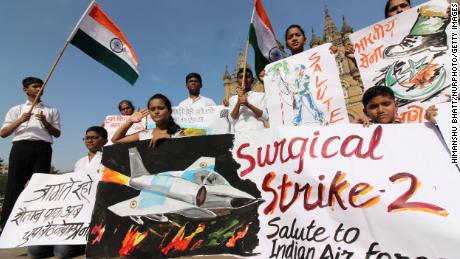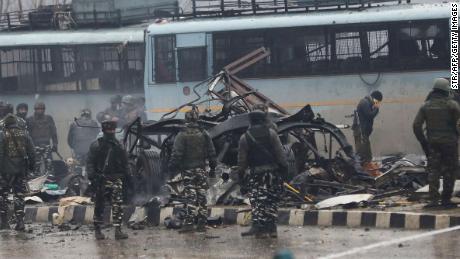(CNN)India and Pakistan have been locked in a struggle over Kashmir for more than 70 years, and the restive region is back in the news again this week.
On Wednesday Pakistan said it shot down two Indian aircraft over Pakistani-controlled Kashmir, just one day after India claimed its air force had launched air strikes against an alleged militant camp in Pakistani territory.
And in mid-February, India accused Pakistan of playing a direct role in a suicide attack that killed 40 Indian paramilitary soldiers in Indian-controlled Kashmir -- the deadliest on security forces since the beginning of the insurgency in the late 1980s.
Pakistan has vehemently denied having a role in the incident, which New Delhi says was carried out by Pakistan-based terrorist group Jaish-e-Mohammed.
Heightened tensions between the two nuclear powers are cause for great concern, the latest eruption in one of the longest-running conflicts on the planet.
And Dr. Adnan Naseemullah, senior lecturer in international relations at King's College London, believes that the situation has got worse during Indian Prime Minister Narendra Modi's time in office, from 2014 to present.
"The X factor is the Modi government," said Naseemullah, who believes that Modi has dealt with Kashmir primarily as a security issue and allowed the political situation to deteriorate to its worst point since the 1980s.
"These dynamics have turbocharged the insurgency that existed before," he said.
Predominantly Hindu India and Muslim-majority Pakistan have fought three wars since 1947, when the two nuclear powers both gained independence from the UK, and came close to another in 1999.
Wars in 1947 and 1965 were fought directly over Kashmir, and ongoing violence has killed more than 47,000 people since 1989.
This toll doesn't include people who have disappeared due to the conflict, and some human rights groups and nongovernmental organizations put the death toll at twice that amount.
So why does the mountainous region mean so much to the two countries?
Kashmir initially remained independent and was free to accede to either nation. When the Hindu king of Kashmir chose to join India in exchange for military protection, Jammu and Kashmir state became the only Muslim-majority state in the country.
Jammu and Kashmir covers around 45% of Kashmir, in the south and east of the region, while Pakistan controls Azad Kashmir, Gilgit and Baltistan, which cover around 35% of the total territory in the north and west. Both countries claim complete ownership of Kashmir; also in the picture is China, which controls around 20% of Kashmir territory known as Aksai Chin.
The issue is also one of the oldest items on the agenda at the United Nations, where India and Pakistan took their dispute soon after independence.
Both countries agreed to a plebiscite in principle, to allow Kashmiris to decide their own future, but it has never been held because it was predicated on the withdrawal of all military forces from the region, which has not happened even decades on.
Indian authorities wanted to show that they could guarantee the rights of Muslims in a secular state, but Kashmir is also key to Pakistani identity as a homeland for Muslims after partition in 1947, said Simona Vittorini, a specialist in South Asian politics at SOAS University of London.
"Kashmir has become a symbolic issue for both countries," Vittorini told CNN via telephone, who added that the situation is further complicated by a growing Kashmiri independence movement that works against the interests of both countries.
Both countries have maintained a fragile ceasefire since 2003, according to the Council on Foreign Relations, although the two rivals regularly exchange fire across the border.
Tensions flared in September 2016, when armed militants attacked a remote Indian Army base near the de-facto border between Indian-controlled Kashmir and Pakistani-controlled Kashmir, known as the Line of Control (LoC), killing 19 Indian soldiers in what was the deadliest attack on the Indian armed forces in decades.
And later that month, two Pakistani soldiers were killed after clashes with Indian troops on the de facto border between the two countries. India put out a different account, saying it had conducted so called surgical strikes by sending ground troops strike a terror target in Pakistani-controlled territory.
However, carrying out air strikes in Pakistani territory is a departure from the norm, according to Vittorini, who said that until this week the Indian air force had not crossed the Line of Control since 1971.
"For some it signalled a paradigmatic shift in India-Pakistan relations," said Vittorini.
In addition to an entrenched historical conflict, Kashmir has taken on greater significance due to contemporary political events.
India is only months away from general elections, due to be held by May.
Populist nationalist Prime Minister Narendra Modi promised to overhaul the economy and create jobs, as well as standing up to India's enemies.
Modi is dealing with economic problems though, including a jobs shortage and falling rural incomes, despite overall growth.
And his Bharatiya Janata Party (BJP) suffered unexpectedly heavy defeats in a series of state elections in December, prompting fears of poor results in the upcoming national poll.
"The Indian election I think plays a part," said Vittorini, who added that Modi was expected to react in some way to the February 14 suicide attack.
The airstrikes boost Modi's image as being strong on defense, and his backers are already seizing on the developments.
BJP president Amit Shah tweeted that Tuesday's "action further demonstrates that India is safe and secure under the strong & decisive leadership" of Modi.
Vittorini said that if the attack had happened outside election season things may have de-escalated more quickly, but "because of the elections tensions may be kept high."
However, Naseemullah believes that the situation could change quickly.
"I don't know how permanent it's going to be," said Naseemullah. "Both India and Pakistan have achieved their objectives."
India attacked an alleged militant camp in response to the suicide attack, and Pakistan has shown that it can defend its airspace against Indian incursions, Naseemullah told CNN.
"That does open up space for de-escalation," he added.






